Module 8 Story time Unit 2 Goldilocks hurried out of the house课件(共38张PPT)
文档属性
| 名称 | Module 8 Story time Unit 2 Goldilocks hurried out of the house课件(共38张PPT) | 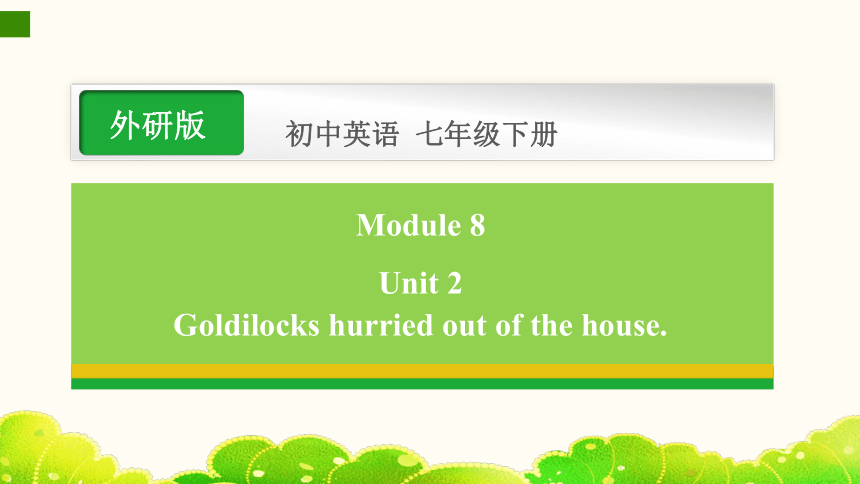 | |
| 格式 | pptx | ||
| 文件大小 | 14.5MB | ||
| 资源类型 | 教案 | ||
| 版本资源 | 外研版 | ||
| 科目 | 英语 | ||
| 更新时间 | 2024-01-23 08:40:09 | ||
图片预览

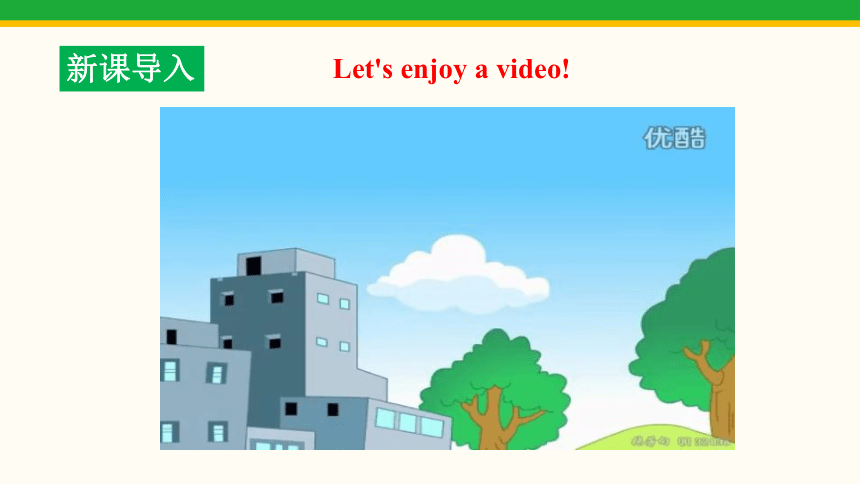
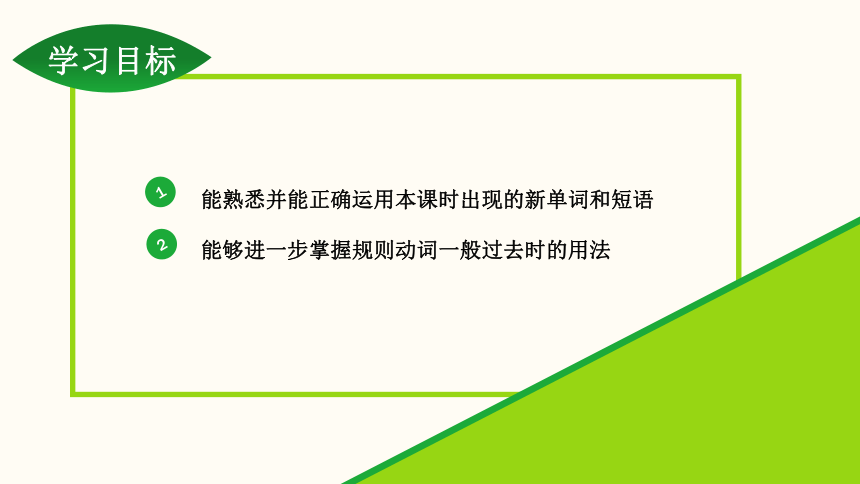
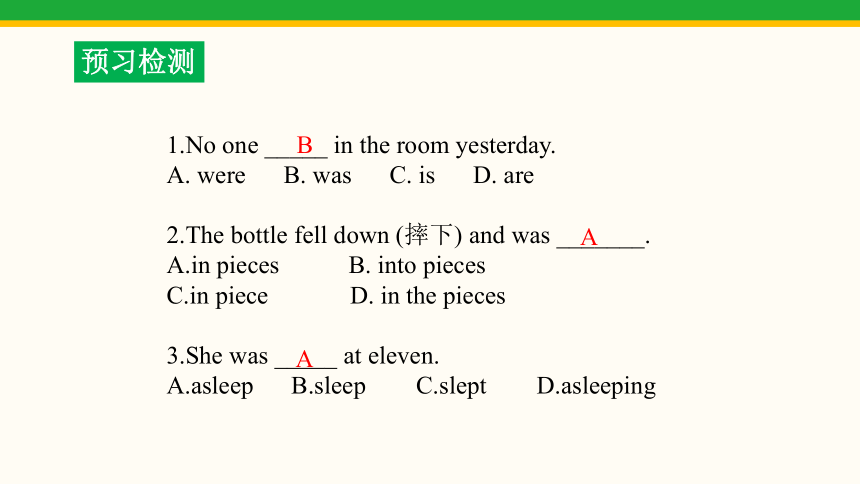
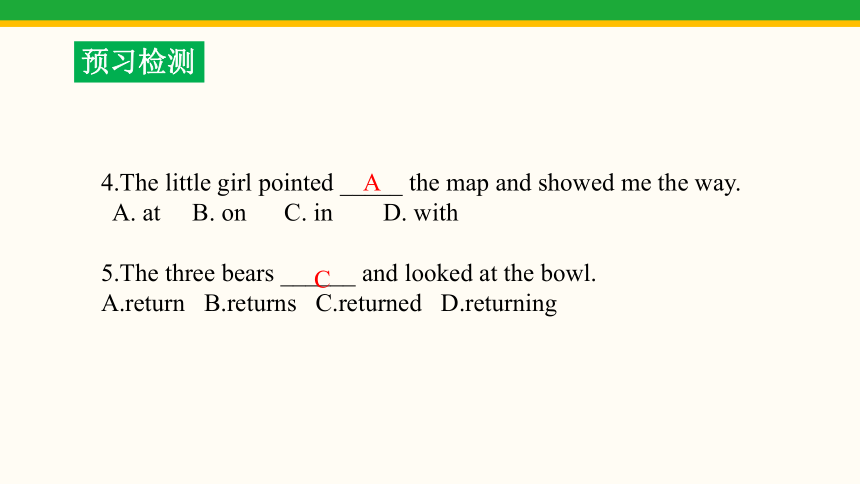
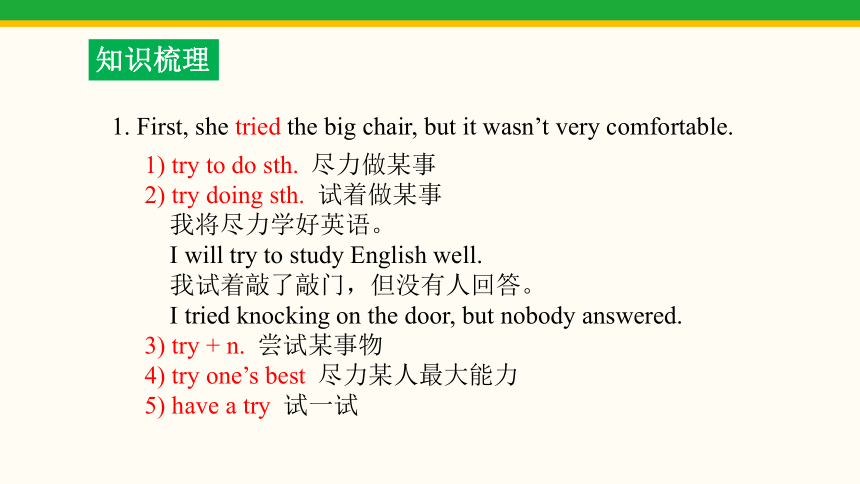
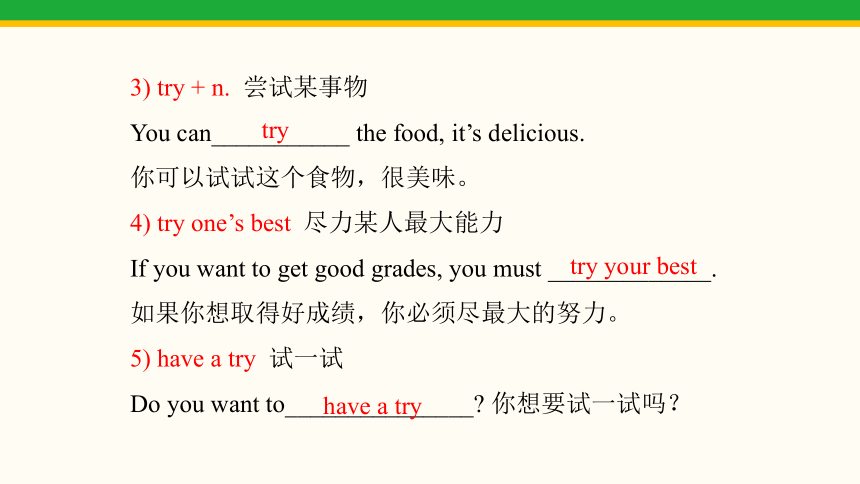
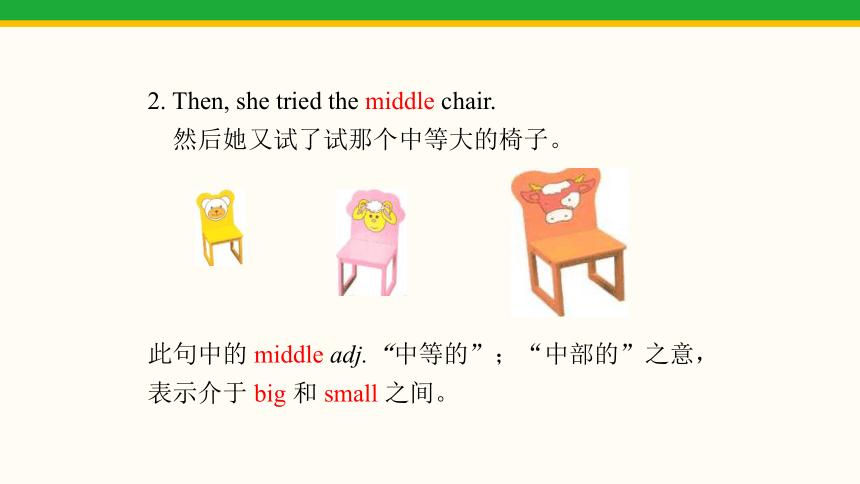
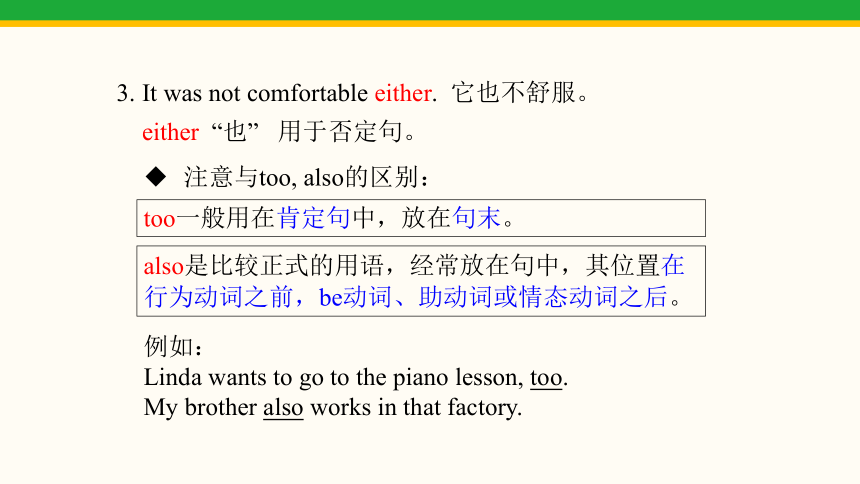
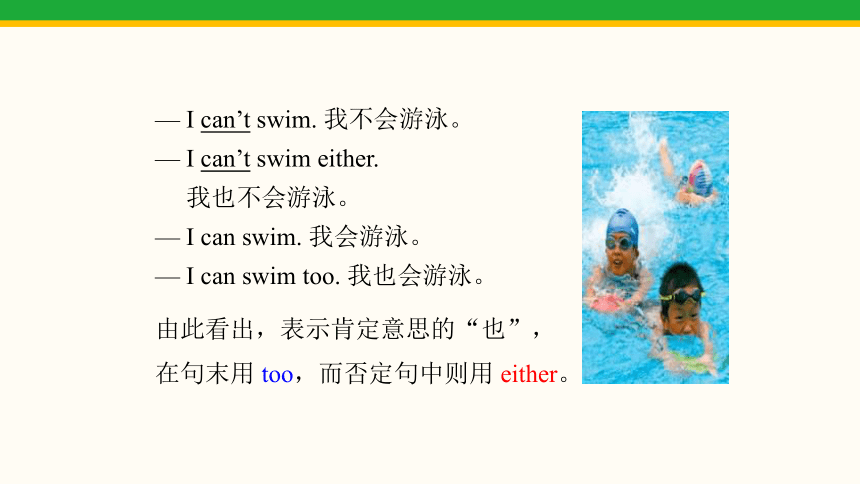

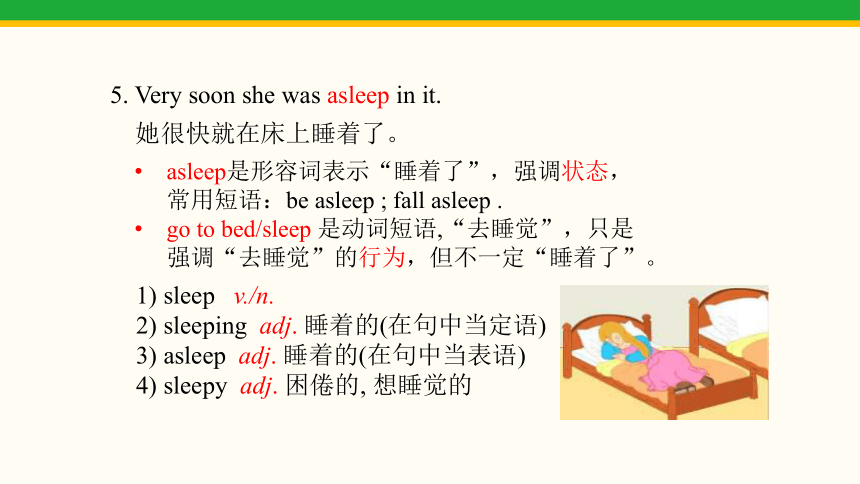
文档简介
(共38张PPT)
外研版
初中英语 七年级下册
Module 8
Unit 2
Goldilocks hurried out of the house.
新课导入
Let's enjoy a video!
1
2
能熟悉并能正确运用本课时出现的新单词和短语
能够进一步掌握规则动词一般过去时的用法
预习检测
1.No one _____ in the room yesterday.
A. were B. was C. is D. are
2.The bottle fell down (摔下) and was _______.
A.in pieces B. into pieces
C.in piece D. in the pieces
3.She was _____ at eleven.
A.asleep B.sleep C.slept D.asleeping
B
A
A
预习检测
4.The little girl pointed _____ the map and showed me the way.
A. at B. on C. in D. with
5.The three bears ______ and looked at the bowl.
A.return B.returns C.returned D.returning
A
C
知识梳理
1) try to do sth. 尽力做某事
2) try doing sth. 试着做某事
我将尽力学好英语。
I will try to study English well.
我试着敲了敲门,但没有人回答。
I tried knocking on the door, but nobody answered.
3) try + n. 尝试某事物
4) try one’s best 尽力某人最大能力
5) have a try 试一试
1. First, she tried the big chair, but it wasn’t very comfortable.
3) try + n. 尝试某事物
You can___________ the food, it’s delicious.
你可以试试这个食物,很美味。
4) try one’s best 尽力某人最大能力
If you want to get good grades, you must _____________.
如果你想取得好成绩,你必须尽最大的努力。
5) have a try 试一试
Do you want to_______________ 你想要试一试吗?
try
try your best
have a try
2. Then, she tried the middle chair.
然后她又试了试那个中等大的椅子。
此句中的 middle adj.“中等的”;“中部的”之意,
表示介于 big 和 small 之间。
also是比较正式的用语,经常放在句中,其位置在行为动词之前,be动词、助动词或情态动词之后。
注意与too, also的区别:
too一般用在肯定句中,放在句末。
例如:
Linda wants to go to the piano lesson, too.
My brother also works in that factory.
3. It was not comfortable either. 它也不舒服。
either “也” 用于否定句。
— I can’t swim. 我不会游泳。
— I can’t swim either.
我也不会游泳。
— I can swim. 我会游泳。
— I can swim too. 我也会游泳。
由此看出,表示肯定意思的“也”,
在句末用 too,而否定句中则用 either。
4. The chair was in pieces! 那把椅子都碎了!
be in pieces 破碎,成为碎片, 坏了
例如: My sunglasses were in pieces.
5. Very soon she was asleep in it.
她很快就在床上睡着了。
1) sleep v./n.
2) sleeping adj. 睡着的(在句中当定语)
3) asleep adj. 睡着的(在句中当表语)
4) sleepy adj. 困倦的, 想睡觉的
asleep是形容词表示“睡着了”,强调状态,常用短语:be asleep ; fall asleep .
go to bed/sleep 是动词短语,“去睡觉”,只是强调“去睡觉”的行为,但不一定“睡着了”。
例如:
1. I’m tired — I’m going to bed.
我累了,我要去睡觉。
2. What time do you go to bed every night 每天晚上你几点睡觉?
3. The children are asleep in the car.
孩子们在车上睡着了。
4. He fell asleep in front of the TV.
他在电视机前睡着了。
6. return v. 意思是“归还”;“返回”
我将在今天下午5点前回到学校。
I’ll return to school before five o’clock this afternoon.
我明天将把书归还给你。
I’ll return the book to you tomorrow.
return sth. to sb. = give back (to…)
归还某人某物
7. Then Baby Bear pointed at the little girl in his bed and shouted …
小熊指着他床上的小女孩喊了起来……
point at 表示“指着某人或某物”;(人或物在近处)
point to 表示“指向……”。(人或物在远处)
The little girl is pointing at the table.
Please point to the sky.
He pointed at the boy. 他指着这个男孩。
He pointed to the south. 他指着南方。
8. Goldilocks jumped out of bed and hurried out of the house
without her basket.
金凤花姑娘从床上跳下来,也顾不上提篮子便冲出了房间。
without作介词,意为“无、没有”,后可接名词、代词或动词的-ing形式作宾语。
如:Mark went out without having breakfast.
那个小男孩没有敲门就进入了房间。
The little boy entered the room without knocking on the door.
e.g. Fish can’t live without water.
There is a bowl without anything in it.
She left without telling us.
使用一般过去时,讲述简单的故事
picked the flower
was lost
noticed / hurried
knocked on the door
Let’s review the story about Goldilocks.
pushed\ entered
counted
was hungry
picked up / was hot
picked up / was cold
finished
What happened next
— I think Goldilocks decided to go home.
— Maybe she stayed in the house.
1. Work in pairs. Say what happened next in Goldilocks and the Three Bears.
Read the story and find all the past forms.
Goldilocks wanted to sit down because she was tired. First, she tried the big chair, but it wasn’t very comfortable. Then she tried the middle chair. It was not comfortable either. Finally, she tried the small chair. It was nice and comfortable, but Goldilocks was very heavy and soon the chair was in pieces.
She walked into the bedroom. There were three beds. She didn't like the middle bed or the big bed. The small bed was very comfortable. Very soon she was asleep in it.
Goldilocks and the Three Bears
The Three Bears returned. They looked at the bowls and the chairs.
Baby Bear cried, “There’s nothing in my bowl and my chair is in pieces!”
He wasn’t very happy!
Next, the Bears looked in their bedroom. They didn’t notice Goldilocks
at first. Then Baby Bear pointed at the little girl in his bed and shouted,
“Look! There’s the bad girl!”
Goldilocks opened her eyes. The Three Bears were all around her, so
Goldilocks jumped out of bed and hurried out of the house without her
basket. She didn’t go for a walk in the forest again.
2. Read the story and number the pictures in the correct order.
2
4
5
3
1
Describe the pictures with verbs.
open
cry
hurry out of
point to, sleep
sit down
3. Match the sentences with the pictures in Activity 2.
1. Goldilocks opened her eyes, jumped out of bed and hurried out of the house.
2. She tried the small chair.
3. The Three Bears returned to their house.
4. Baby Bear cried because there was nothing in his bowl and his chair was in pieces.
5. Baby Bear pointed at Goldilocks. She was asleep in bed.
c
d
a
e
b
4. Read and check( ) the true sentences.
Goldilocks liked the big chair.
Goldilocks liked the small bed.
Baby Bear looked in the bedroom.
The Three Bears were happy to see Goldilocks.
5. Goldilocks didn’t like the Three Bears.
——
didn't like
——
weren't
return
cry, nothing, in pieces
jump, hurry
try chairs, sit down first/then/finally, in pieces,
bedroom, asleep,
point at, shout
Retell the story according to the pictures
Group work
Complete sentences for each picture.
1.Goldilocks________ all the food in the small bowl.
2.The Three Bears_________ to their house.
3.The Baby Bears_______at the bowls and the chairs, he______.
4.The Baby Bear________at the little Girl in his bed
and________: “look, there’s the bad girl.”
5.Goldilocks________ out of the house without her basket.
finished
returned
looked
cried
pointed
shouted
hurried
Goldilocks tried the three chairs and liked the small chair,
but she was very heavy and soon the small chair was in (1)______.
She walked into the bedroom. She tried the middle bed, but it
wasn’t comfortable and the big bed wasn’t comfortable(2) ______.
Very soon she was (3)______ in the small bed.
Then the Three Bears (4)_________ to their house. They walked up to their bedroom. Baby Bear (5)__________ at Goldilocks and(6) _________, “That’s her! She finished my food and … look at my chair!” Goldilocks jumped up and hurried out of the house (7)________ her basket.
asleep either piece point return shout without
pieces
either
asleep
returned
pointed
shouted
5.Complete the passage with the correct form of the words from the box.
without
7. Read the story in Activity 2 again. Imagine what will happen next. Write at least three sentences.
展开想象,接下来会发生什么事情,至少写三个句子
通过以
活动小结
通过以上活动,我们可以知道,讲故事需要使用的时态是1. ,它表示2. 。
一般过去时
过去发生的动作或状态
探究二
使用连接词“first, then, next, finally”等表达顺序
Goldilocks wanted to sit down because she was tired. First, she tried the big chair, but it wasn’t very comfortable. Then she tried the middle chair. It was not comfortable either. Finally, she tried the small chair. It was nice and comfortable, but Goldilocks was very heavy and soon the chair was in pieces.
Next, the Bears looked in their bedroom. They didn’t
notice Goldilocks at first. Then Baby Bear pointed at the
little girl in his bed and shouted,
“Look! There’s the bad girl!”
仔细阅读第一段和第四段,观察如何表达顺序
结论:可以使用first,then,next,finally等去表达先后顺序。
6. Look at the sentences.
1. First, she tried the big chair.
2. Then she tried the middle chair.
3. Finally, she tried the small chair.
Now write some new sentences. Use first, next/then and finally.
pick up / very big bowl / didn't like / too hot pick up / big bowl / didn't like / too cold
pick up / small bowl / like / good
Answers:
1. First, she picked up the very big bowl but she didn’t like it— it was too hot.
2. Next /Then, she picked up the big bowl but she didn’t like it— it was too cold.
3. Finally, she picked up the small bowl and she like it— it was good.
Writing
用first, next, then, finally等词描写《狼来了》的故事。
Once there was a boy who lived on a farm. First, every day he had to take his father’s sheep to a hill. Next, one day he tried to play a trick on the other people. He said to himself. I will call “Wolf! Wolf!” then everyone come to help me. It will be fun when they find out there is no wolf after all. So he cried, “Wolf! Wolf!” and everyone ran to help him. Then, when people came, he just said, “There is no wolf. It was only a joke.”
He did this three times.
Finally, one day a wolf really came. “Help! Help! The wolf is here.” called the boy. But everyone said, “No, you know that there is no wolf. He is just calling us for fun. There is no danger.”
So they did not go to help the boy. The wolf killed all the sheep then.
What can we learn from the story
通过以上的活动,我们通过以上的活动,我们可以了解到,“10年之后”可以表达为1. ;“你的学校将会是什么样的”可以通过以上的活动,我们可以了解到,“10年之后”可以表达为1. ;“你的学校将会是什么样的”可以说成2. ;“将来的学校会不同吗?”可以表达为3. 。说成2. ;“将来的学校会不同吗?”可以表达为3. 。可以了解到,“10年之后”可以表达为1. ;“你的学校将会是什么样的”可以说成2. ;“将来的学校会不同吗?”可以表达为3. 。
活动小结
通过以上活动,我们可以知道,表示事情的发展顺序的词有:first 意为1. ,next意为2. ,then 意为3. ,finally意为4. 。
首先
接下来
然后
最后
当堂检测
1. 他向四周看,但是什么也看不见。
He _____ _______ , but he could see nothing.
2. 老人指着那棵大树给我们讲了一个故事。
The old man _______ __ the big tree and told us a story.
looked around
pointed at
3. 当我走进房间,我发现花瓶碎片散落在地。
When I entered the room, I found the vase lay __ _____ on the floor.
4. 闹钟一响,我立刻跳下床。
As soon as I hear my alarm clock, I _______ ____ __ my bed.
in pieces
jumped out of
一、请根据汉语意思完成下列英语句子,每空一词。
二、请根据题后括号内的要求改写下列句子。
1. They lived in a small house. (改为否定句)
They ______ ____ in a small house.
2. Sandy knocked on the door just now. (改为一般疑问句)
____ Sandy ______ on the door just now
didn't live
Did knock
3. He didn’t like the biggest bowl. (改为肯定句)
He _____ the biggest bowl.
4. There isn’t anything in the box. (改为同义句)
There is ________in the box.
5. He gave back the book to me yesterday. (同上)
He _________ the book ___ me yesterday.
liked
nothing
returned to
进一步掌握一般过去时的用法
重点单词:asleep, return, cry, point
重点短语:try to do, try doing, try one’s best, have a try, be asleep, return to, be in pieces, point at/to, at first
重点句式:First, ...
Then, …
Next, …
Finally, …
Module 8
Unit 2
使用连接词“first, then, next, finally”等表达顺序
外研版
初中英语 七年级下册
Module 8
Unit 2
Goldilocks hurried out of the house.
新课导入
Let's enjoy a video!
1
2
能熟悉并能正确运用本课时出现的新单词和短语
能够进一步掌握规则动词一般过去时的用法
预习检测
1.No one _____ in the room yesterday.
A. were B. was C. is D. are
2.The bottle fell down (摔下) and was _______.
A.in pieces B. into pieces
C.in piece D. in the pieces
3.She was _____ at eleven.
A.asleep B.sleep C.slept D.asleeping
B
A
A
预习检测
4.The little girl pointed _____ the map and showed me the way.
A. at B. on C. in D. with
5.The three bears ______ and looked at the bowl.
A.return B.returns C.returned D.returning
A
C
知识梳理
1) try to do sth. 尽力做某事
2) try doing sth. 试着做某事
我将尽力学好英语。
I will try to study English well.
我试着敲了敲门,但没有人回答。
I tried knocking on the door, but nobody answered.
3) try + n. 尝试某事物
4) try one’s best 尽力某人最大能力
5) have a try 试一试
1. First, she tried the big chair, but it wasn’t very comfortable.
3) try + n. 尝试某事物
You can___________ the food, it’s delicious.
你可以试试这个食物,很美味。
4) try one’s best 尽力某人最大能力
If you want to get good grades, you must _____________.
如果你想取得好成绩,你必须尽最大的努力。
5) have a try 试一试
Do you want to_______________ 你想要试一试吗?
try
try your best
have a try
2. Then, she tried the middle chair.
然后她又试了试那个中等大的椅子。
此句中的 middle adj.“中等的”;“中部的”之意,
表示介于 big 和 small 之间。
also是比较正式的用语,经常放在句中,其位置在行为动词之前,be动词、助动词或情态动词之后。
注意与too, also的区别:
too一般用在肯定句中,放在句末。
例如:
Linda wants to go to the piano lesson, too.
My brother also works in that factory.
3. It was not comfortable either. 它也不舒服。
either “也” 用于否定句。
— I can’t swim. 我不会游泳。
— I can’t swim either.
我也不会游泳。
— I can swim. 我会游泳。
— I can swim too. 我也会游泳。
由此看出,表示肯定意思的“也”,
在句末用 too,而否定句中则用 either。
4. The chair was in pieces! 那把椅子都碎了!
be in pieces 破碎,成为碎片, 坏了
例如: My sunglasses were in pieces.
5. Very soon she was asleep in it.
她很快就在床上睡着了。
1) sleep v./n.
2) sleeping adj. 睡着的(在句中当定语)
3) asleep adj. 睡着的(在句中当表语)
4) sleepy adj. 困倦的, 想睡觉的
asleep是形容词表示“睡着了”,强调状态,常用短语:be asleep ; fall asleep .
go to bed/sleep 是动词短语,“去睡觉”,只是强调“去睡觉”的行为,但不一定“睡着了”。
例如:
1. I’m tired — I’m going to bed.
我累了,我要去睡觉。
2. What time do you go to bed every night 每天晚上你几点睡觉?
3. The children are asleep in the car.
孩子们在车上睡着了。
4. He fell asleep in front of the TV.
他在电视机前睡着了。
6. return v. 意思是“归还”;“返回”
我将在今天下午5点前回到学校。
I’ll return to school before five o’clock this afternoon.
我明天将把书归还给你。
I’ll return the book to you tomorrow.
return sth. to sb. = give back (to…)
归还某人某物
7. Then Baby Bear pointed at the little girl in his bed and shouted …
小熊指着他床上的小女孩喊了起来……
point at 表示“指着某人或某物”;(人或物在近处)
point to 表示“指向……”。(人或物在远处)
The little girl is pointing at the table.
Please point to the sky.
He pointed at the boy. 他指着这个男孩。
He pointed to the south. 他指着南方。
8. Goldilocks jumped out of bed and hurried out of the house
without her basket.
金凤花姑娘从床上跳下来,也顾不上提篮子便冲出了房间。
without作介词,意为“无、没有”,后可接名词、代词或动词的-ing形式作宾语。
如:Mark went out without having breakfast.
那个小男孩没有敲门就进入了房间。
The little boy entered the room without knocking on the door.
e.g. Fish can’t live without water.
There is a bowl without anything in it.
She left without telling us.
使用一般过去时,讲述简单的故事
picked the flower
was lost
noticed / hurried
knocked on the door
Let’s review the story about Goldilocks.
pushed\ entered
counted
was hungry
picked up / was hot
picked up / was cold
finished
What happened next
— I think Goldilocks decided to go home.
— Maybe she stayed in the house.
1. Work in pairs. Say what happened next in Goldilocks and the Three Bears.
Read the story and find all the past forms.
Goldilocks wanted to sit down because she was tired. First, she tried the big chair, but it wasn’t very comfortable. Then she tried the middle chair. It was not comfortable either. Finally, she tried the small chair. It was nice and comfortable, but Goldilocks was very heavy and soon the chair was in pieces.
She walked into the bedroom. There were three beds. She didn't like the middle bed or the big bed. The small bed was very comfortable. Very soon she was asleep in it.
Goldilocks and the Three Bears
The Three Bears returned. They looked at the bowls and the chairs.
Baby Bear cried, “There’s nothing in my bowl and my chair is in pieces!”
He wasn’t very happy!
Next, the Bears looked in their bedroom. They didn’t notice Goldilocks
at first. Then Baby Bear pointed at the little girl in his bed and shouted,
“Look! There’s the bad girl!”
Goldilocks opened her eyes. The Three Bears were all around her, so
Goldilocks jumped out of bed and hurried out of the house without her
basket. She didn’t go for a walk in the forest again.
2. Read the story and number the pictures in the correct order.
2
4
5
3
1
Describe the pictures with verbs.
open
cry
hurry out of
point to, sleep
sit down
3. Match the sentences with the pictures in Activity 2.
1. Goldilocks opened her eyes, jumped out of bed and hurried out of the house.
2. She tried the small chair.
3. The Three Bears returned to their house.
4. Baby Bear cried because there was nothing in his bowl and his chair was in pieces.
5. Baby Bear pointed at Goldilocks. She was asleep in bed.
c
d
a
e
b
4. Read and check( ) the true sentences.
Goldilocks liked the big chair.
Goldilocks liked the small bed.
Baby Bear looked in the bedroom.
The Three Bears were happy to see Goldilocks.
5. Goldilocks didn’t like the Three Bears.
——
didn't like
——
weren't
return
cry, nothing, in pieces
jump, hurry
try chairs, sit down first/then/finally, in pieces,
bedroom, asleep,
point at, shout
Retell the story according to the pictures
Group work
Complete sentences for each picture.
1.Goldilocks________ all the food in the small bowl.
2.The Three Bears_________ to their house.
3.The Baby Bears_______at the bowls and the chairs, he______.
4.The Baby Bear________at the little Girl in his bed
and________: “look, there’s the bad girl.”
5.Goldilocks________ out of the house without her basket.
finished
returned
looked
cried
pointed
shouted
hurried
Goldilocks tried the three chairs and liked the small chair,
but she was very heavy and soon the small chair was in (1)______.
She walked into the bedroom. She tried the middle bed, but it
wasn’t comfortable and the big bed wasn’t comfortable(2) ______.
Very soon she was (3)______ in the small bed.
Then the Three Bears (4)_________ to their house. They walked up to their bedroom. Baby Bear (5)__________ at Goldilocks and(6) _________, “That’s her! She finished my food and … look at my chair!” Goldilocks jumped up and hurried out of the house (7)________ her basket.
asleep either piece point return shout without
pieces
either
asleep
returned
pointed
shouted
5.Complete the passage with the correct form of the words from the box.
without
7. Read the story in Activity 2 again. Imagine what will happen next. Write at least three sentences.
展开想象,接下来会发生什么事情,至少写三个句子
通过以
活动小结
通过以上活动,我们可以知道,讲故事需要使用的时态是1. ,它表示2. 。
一般过去时
过去发生的动作或状态
探究二
使用连接词“first, then, next, finally”等表达顺序
Goldilocks wanted to sit down because she was tired. First, she tried the big chair, but it wasn’t very comfortable. Then she tried the middle chair. It was not comfortable either. Finally, she tried the small chair. It was nice and comfortable, but Goldilocks was very heavy and soon the chair was in pieces.
Next, the Bears looked in their bedroom. They didn’t
notice Goldilocks at first. Then Baby Bear pointed at the
little girl in his bed and shouted,
“Look! There’s the bad girl!”
仔细阅读第一段和第四段,观察如何表达顺序
结论:可以使用first,then,next,finally等去表达先后顺序。
6. Look at the sentences.
1. First, she tried the big chair.
2. Then she tried the middle chair.
3. Finally, she tried the small chair.
Now write some new sentences. Use first, next/then and finally.
pick up / very big bowl / didn't like / too hot pick up / big bowl / didn't like / too cold
pick up / small bowl / like / good
Answers:
1. First, she picked up the very big bowl but she didn’t like it— it was too hot.
2. Next /Then, she picked up the big bowl but she didn’t like it— it was too cold.
3. Finally, she picked up the small bowl and she like it— it was good.
Writing
用first, next, then, finally等词描写《狼来了》的故事。
Once there was a boy who lived on a farm. First, every day he had to take his father’s sheep to a hill. Next, one day he tried to play a trick on the other people. He said to himself. I will call “Wolf! Wolf!” then everyone come to help me. It will be fun when they find out there is no wolf after all. So he cried, “Wolf! Wolf!” and everyone ran to help him. Then, when people came, he just said, “There is no wolf. It was only a joke.”
He did this three times.
Finally, one day a wolf really came. “Help! Help! The wolf is here.” called the boy. But everyone said, “No, you know that there is no wolf. He is just calling us for fun. There is no danger.”
So they did not go to help the boy. The wolf killed all the sheep then.
What can we learn from the story
通过以上的活动,我们通过以上的活动,我们可以了解到,“10年之后”可以表达为1. ;“你的学校将会是什么样的”可以通过以上的活动,我们可以了解到,“10年之后”可以表达为1. ;“你的学校将会是什么样的”可以说成2. ;“将来的学校会不同吗?”可以表达为3. 。说成2. ;“将来的学校会不同吗?”可以表达为3. 。可以了解到,“10年之后”可以表达为1. ;“你的学校将会是什么样的”可以说成2. ;“将来的学校会不同吗?”可以表达为3. 。
活动小结
通过以上活动,我们可以知道,表示事情的发展顺序的词有:first 意为1. ,next意为2. ,then 意为3. ,finally意为4. 。
首先
接下来
然后
最后
当堂检测
1. 他向四周看,但是什么也看不见。
He _____ _______ , but he could see nothing.
2. 老人指着那棵大树给我们讲了一个故事。
The old man _______ __ the big tree and told us a story.
looked around
pointed at
3. 当我走进房间,我发现花瓶碎片散落在地。
When I entered the room, I found the vase lay __ _____ on the floor.
4. 闹钟一响,我立刻跳下床。
As soon as I hear my alarm clock, I _______ ____ __ my bed.
in pieces
jumped out of
一、请根据汉语意思完成下列英语句子,每空一词。
二、请根据题后括号内的要求改写下列句子。
1. They lived in a small house. (改为否定句)
They ______ ____ in a small house.
2. Sandy knocked on the door just now. (改为一般疑问句)
____ Sandy ______ on the door just now
didn't live
Did knock
3. He didn’t like the biggest bowl. (改为肯定句)
He _____ the biggest bowl.
4. There isn’t anything in the box. (改为同义句)
There is ________in the box.
5. He gave back the book to me yesterday. (同上)
He _________ the book ___ me yesterday.
liked
nothing
returned to
进一步掌握一般过去时的用法
重点单词:asleep, return, cry, point
重点短语:try to do, try doing, try one’s best, have a try, be asleep, return to, be in pieces, point at/to, at first
重点句式:First, ...
Then, …
Next, …
Finally, …
Module 8
Unit 2
使用连接词“first, then, next, finally”等表达顺序
同课章节目录
- Module 1 Lost and found
- Unit 1 Whose bag is this?
- Unit 2 Are they yours?
- Unit 3 Language in use
- Module 2 What can you do ?
- Unit 1 I can play the piano
- Unit 2 I can run really fast
- Unit 3 Language in use
- Module 3 Making plans
- Unit 1 What are you going to do at the weekends?
- Unit 2 We're going to cheer the players.
- Unit 3 Language in use
- Module 4 Life in the future
- Unit 1 Everyone will study at home
- Unit 2 Every family will have a small plane.
- Unit 3 Language in use
- Module 5 Shopping
- Unit 1 What can I do for you?
- Unit 2 You can buy everything on the Internet
- Unit 3 Language in use
- Module 6 Around town
- Unit 1 Could you tell me how to get to the Nationa
- Unit 2 The London Eye is on your right.
- Unit 3 Language in use
- Revision module A
- Module 7 My past life
- Unit 1 I was born in a small village.
- Unit 2 I was born in Quincy.
- Unit 3 Language in use
- Module 8 Story time
- Unit 1 Once upon a time….
- Unit 2 Goldilocks hurried out of the house.
- Unit 3 Language in use
- Module 9 Life history
- Unit 1 He left school and began work at the age of
- Unit 2 He decided to be an actor.
- Unit 3 Language in use
- Module 10 A holiday journey
- Unit 1 What did you do?
- Unit 2 This morning we took a walk.
- Unit 3 Language in use
- Module 11 Body language
- Unit 1 They touch noses!
- Unit 2 Here are some ways to welcome them.
- Unit 3 Language in use
- Module 12 Western music
- Unit 1 It's so beautiful!
- Unit 2 Vienna is the centre of European classical
- Unit 3 Language in use
- Revision module B
